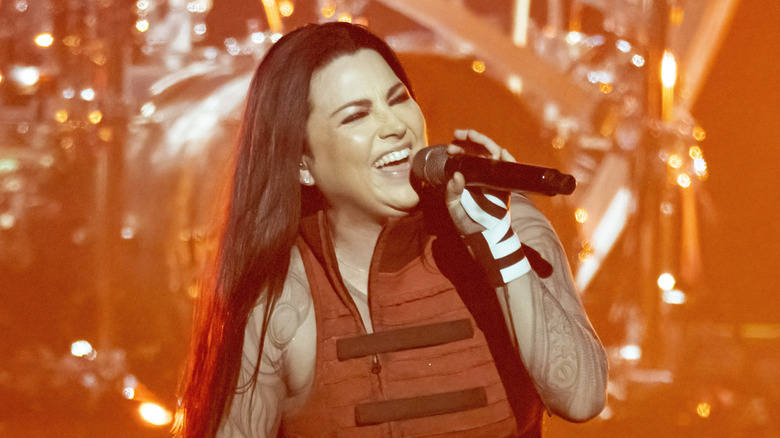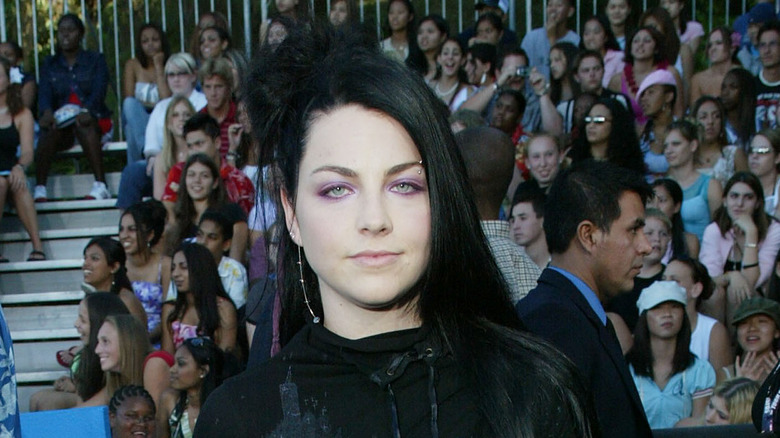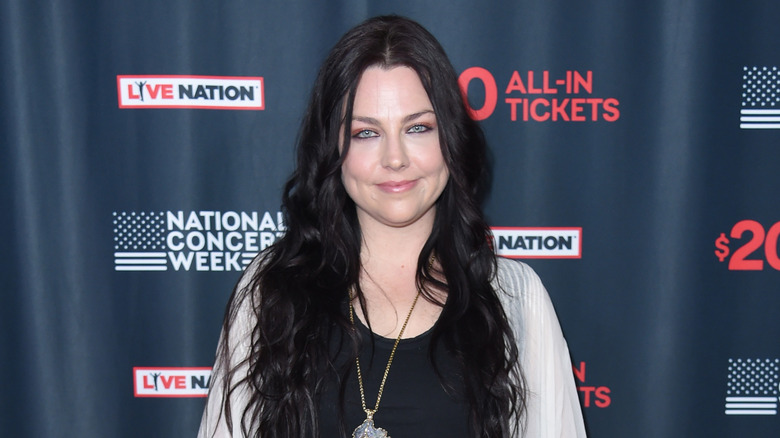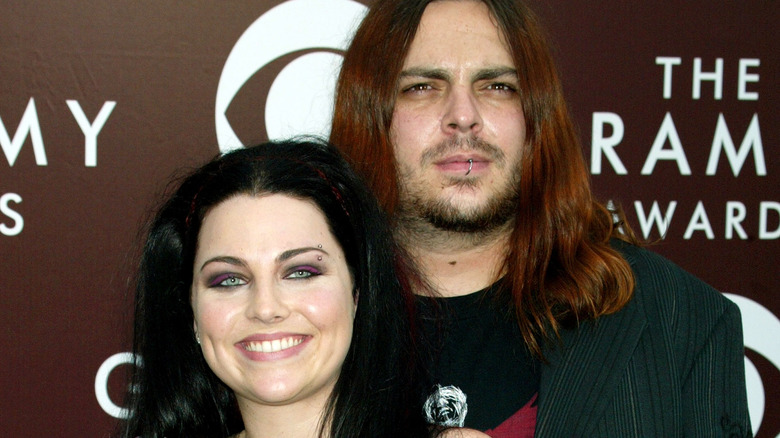The Tragic Real-Life Story Of Evanescence's Amy Lee
In the early 2000s, Amy Lee and Evanescence exploded out of seemingly nowhere, taking the music scene by storm and building a special connection with their fans because of the poignancy of their music. There was a rawness, perhaps even sadness to the lyrics, as Lee sang about everything from relationship woes to dealing with severe grief and loss.
Like all good lyricists and writers, though, Lee drew inspiration from personal experience and channeled it into her art. Throughout the years, she has peeled back the curtain to discuss the tragedies that have shaped her, such as the loss of not only one but two of her siblings. In addition, she spoke out about the issues she had with Evanescence co-founder, Ben Moody, and how his departure proved to be a godsend because "the drama" was finally gone. This wouldn't be the only trouble she would face with the band, as she fought against the sexism of the music scene and even fired the group's manager for a litany of alleged offenses, including sexual misconduct. Plus many of Amy Lee's former bandmates have some not-so-good things to say about her.
Unlike many rock musicians who tasted slivers of success in the 2000s then disappeared, Lee continues to be active in the industry. Through Evanescence or her solo projects, she still uses her pain as fuel for her art.
At 6 years old, Amy Lee lost her sister
Evanescence's somber song "Hello" — off the 2003 album "Fallen" — begins with the heart-crushing lyrics: "Playground school bell rings again. Rain clouds come to play again. Has no one told you she's not breathing?" It isn't too difficult to decipher the track is about losing someone close to you, perhaps even a child. For Amy Lee, the story behind the track remains tragic and deeply personal. At the tender age of 6, she lost her 3-year-old sister.
In a 2004 interview with Blender, Lee didn't disclose the illness her sister died from or how she passed away, but she revealed how the medical professionals struggled to make sense of it all as well. The event left a defining mark on her that changed the course of her life. "When that happened, my whole perception of life changed," she said. "It sounds stupid, but that was when I became an artist. The music is my attempt to heal myself. Things like that can destroy you, or you can get through it."
In 2023, Lee spoke to Kerrang about the tracks from "Fallen," which included looking back at "Hello" and what it means to her. Again, Lee expressed how important the song was to her healing process and how it connected with others who experienced loss. She explained how it might have been too difficult to perform the song live when it was first released, but she's ready to do so now.
Her younger brother died at the age of 24
In January 2018, 36-year-old Amy Lee lost another sibling — her younger brother, Robby, who had severe epilepsy and died at the age of 24. However, that doesn't mean Robby's death was easier to deal with as an adult, as she explained to Kerrang.
Lee revealed how the deaths of both her siblings affected her, even if they stirred up different emotions and feelings because of the specific period of her life. "The first time I was six, so the processing was very different," she said. "That was more about fear; this time it was more about love and pain. The perspective is very valuable, but I'd rather not have it. I'd rather he be here more than anything," she said. Much like the tragedy of her sister's death found its way into Lee's lyrics for Evanescence's "Fallen," so too did Robby's passing for the 2021 album, "The Bitter Truth."
According to Robby Lee's obituary on Roller Funeral Homes, he shared a passion for music like his sister and proclaimed his love for one of the most important rock bands of the 1960s: the Beatles. Robby played a number of musical instruments, too, and even provided additional vocals for the Beatles cover, "Hello, Goodbye" on his sister's 2016 children's album, "Dream Too Much."
She experienced the sexism of the early 2000s music scene
When Evanescence appeared in the music scene, nu metal stood out as one of metal's popular subgenres at the time. Bands like Limp Bizkit built empires singing about "nookie" and featuring scantily clad female dancers in their music videos. It wasn't anything new, though, as the music industry was still stuck in the prehistoric age with its attitude toward women and how they were presented. It was predominantly a case of "sex sells," and even female musicians like Amy Lee had to deal with the rampant misogyny.
Despite Lee's operatic voice being a distinctive trait of Evanescence, the group's first label, Wind-up Records, wanted a male singer to be a part of the band in a rapping role. Lee wasn't thrilled with the idea, eventually compromising and accepting 12 Stones' Paul McCoy as a guest vocalist on "Bring Me to Life." However, as she explained to The Forty-Five, "That was really hard for me because I had to start out with our first song feeling like I made a sacrifice on my art."
Lee admitted she didn't speak up often enough because females were painted as difficult if they did. In addition to this, the musician didn't feel as if the press helped either as they painted the idea of a female-fronted rock band being a gimmick, as Lee told Vanity Fair. Consequently, she didn't feel as if she was receiving the same level of respect as her male contemporaries.
She experienced anxiety and depression at a young age
Some rockers party way too hard to deal with their problems; however, Evanescence's Amy Lee has always treated music as both a remedy and outlet. Speaking to Audacy — formerly known as Radio.com — Lee revealed how she experienced anxiety and depression from a young age. However, she found the best way to deal with it was through creation of some kind.
"The way that I am able to self-soothe and create my own therapy is through the catharsis of creation," she said. "Whether it's making music, making food, or painting something, creation makes me feel good." Lee also explained how even though it's trauma and painful events that often shape her music, they usually manifest into something beautiful in the end in the form of music.
In a separate discussion on the podcast "Hardcore Humanism," Lee elaborated on how she confronts the darkness through her music to find light, as it helps her to heal and find renewed purpose.
She was bullied at school for being different
High school isn't an easy ride for any teenager. Not only are there raging hormones and awkward growth spurts to deal with, but also the societal pressure to fit in with others. For those who choose to paint outside of the lines, however, it can be even tougher, as Evanescence's Amy Lee found out.
In an interview with Spin, Lee revealed that her family moved around because of her father's radio career that would see him moving stations regularly. When she was 13, they settled in Arkansas, and she instantly felt like an outsider among her peers who had known each other since childhood and all chose conformity over individualism. "I was the only one who dressed really weird," she said. "I had these green boots and this 'Blossom' hat and all of these stupid accessories. At my old school, that was cool, but at this school, everyone was wearing the same thing: Banana Republic shirts and Birkenstocks and socks."
Lee added how she stuck to herself and used to draw in her sketchbook when at school. One day, she came back to her desk and discovered her sketchbook's pages were all ripped out. When she asked someone what happened, they told her that another girl tore it up because she didn't like how Lee dressed. Despite being bullied for her fashion sense, Lee refused to succumb to the pressure. In fact, she still designs her own clothes to wear on stage.
She wrote Fallen about an abusive relationship she was in for three years
If Evanescence's "Fallen" feels raw and personal, it's because it is. In an interview with Spin in 2006, Amy Lee admitted that the bulk of the album was inspired by an abusive relationship she was in for three years — especially the single "Going Under." While Lee found the music to be cathartic to what she was experiencing at the time, she also discovered that it served as a stark reminder of how she should have left the person sooner than she did.
"After I recorded those songs, I was listening to my own words on 'Going Under,'" she said. "When it goes to the chorus, what I would have loved to hear myself sing is, 'I'm leaving and I'm not going to put up with this anymore.' But instead the line is, 'I'm going under, drowning in you.' I was thinking to myself, 'You know what you need to do, and you're not doing it.'"
Despite the bad relationship being a major theme in the writing of "Fallen," there was another track inspired by a certain someone who — to paraphrase the song — brought Lee back to life. In the years after the song's release, Lee admitted that "Bring Me to Life" was written about her husband, Josh Hartzler, who was a friend back then and saw through her facade as she was still in her abusive relationship and convincing herself that everything was okay.
Amy Lee claimed her former bandmate was physically and verbally abusive to her
The formation of Evanescence can be traced back to when Amy Lee and Ben Moody met at a camp and bonded over their mutual love of music as teenagers. Reportedly, they even dated for a short while. The pair co-wrote the band's first album, "Fallen," and the world anticipated what they would do next after such a dazzling debut. There wouldn't be a chance to find out, though, as Moody departed the band halfway through a tour in October 2003.
The split was far from harmonious as Lee is reported to have told Evanescence's former band manager, Dennis Rider, about Moody's alleged physical and verbal abuse of her. Speaking to Spin, she also accused Moody of being "all about the drama" and "a really unhappy person." Additionally, she said the band was in a better place immediately after he left, even claiming to have photos of everyone's happiness on the day in which he officially announced he was done.
In a separate interview with Blender, Lee said, "I don't hate Ben. I just don't ever want to speak to him again. He was truly kind of poisonous. Some people just aren't good for you — it doesn't mean they're Satan, but you can't have them in your life." Moody remained more cagey about the split, having told MTV in 2005 that he wished Evanescence well and that his departure was the best for everyone involved.
She accused her former manager of sexual misconduct
By no means does Evanescence feature as one of the rock bands with the worst drama, but they went through the wringer after their meteoric rise, and the success of "Fallen" in 2003 was equalized by member departures and the firing of their then-manager, Dennis Rider, in November 2005. A month later, Rider countersued Amy Lee, who held the rights for Evanescence, for breach of contract, demanding $10 million in restitution. Lee filed her own bombshell lawsuit against Rider, claiming a laundry list of offenses.
Lee alleged that Rider spent his time chasing extramarital affairs instead of focusing on her and the band's career. In addition, there were other claims that Rider used Lee's credit card for his own personal expenses, including buying a car for his mistress and hotel stays for romantic rendezvouses.
However, the most shocking allegation came in the form of sexual misconduct. Lee claimed instances where Rider made unwanted sexual advances toward her, including putting his head in her lap and running his hand up her leg, as well as telling her "he wanted to perform a gynecological examination on her"(via MTV). Through his attorney, Rider denied the allegations, claiming that it was through the manager's efforts that Evanescence became global superstars, and he only behaved in a professional manner around Lee.
Call Me When You're Sober was written about a turbulent relationship
Worlds collided when Seether frontman Shaun Morgan collaborated with Amy Lee, who was his then-girlfriend, on "Broken." The ballad was inspired by the breakdown of Morgan's marriage after his wife chose to stay in South Africa rather than move with him to the United States in the early 2000s. As Morgan told Psychology Today, this event affected him as he felt insecure and alone in a new country, eventually turning to alcohol and drugs as coping mechanisms. Ultimately, this resulted in other self-destructive behaviors, including cheating on partners.
While neither Morgan nor Lee confirmed infidelity was the cause of their breakup, fans found out their relationship was over after Lee admitted the single "Call Me When You're Sober" was written about Morgan. The lyrics left no room for interpretation of what she felt was the issue. Lee also addressed the relationship in a 2006 interview with Blender, stating, "It was good for a while. But it ended really, really wrong. It's just that fatal thing — girls are so attracted to a***holes."
Morgan went to rehab in 2006, but he wasn't pleased about the song. "In any relationship, I don't think it's right to say and do those things when people break up, and she obviously felt the need to go out there and make me sound like a complete a***hole," he told MTV. "What can I do? I just refuse to lower myself to that level."
Amy Lee was stalked
Many rock stars grow to loathe fame because of demanding followers who refuse to give them a moment's peace or respite from being a celebrity. It can be anything and everything from autograph hunters camping outside of hotels, crowds surrounding tour buses as the musicians arrive at a venue, to the occasional fan who won't stop clogging up their DMs on social media. However, there's a darker, more sinister side of fandom that every musician hopes to never encounter: stalkers.
As Evanescence exploded to mega-superstardom in the early 2000s, Amy Lee encountered her share of overzealous fans crossing personal boundaries and trying to get too close for comfort. "I went through some weird experiences with stalkers," she told VH1 in 2006. "It's weird how it works. My lyrics are so intimate that people feel like they really know me, and I don't know them at all. My privacy had been completely invaded and there were a couple of nights where I couldn't stay at my house."
Much like the other tragedies in her life, Lee took the scary experience and channeled it into her art. The haunting song "Snow White Queen" — which is off Evanescence's second album, "The Open Door" — is inspired by what she went through. The track features a dual approach as the lyrics showcase Lee's fear and violation of privacy, as well as what she imagined her stalker to be thinking as they watched her.










